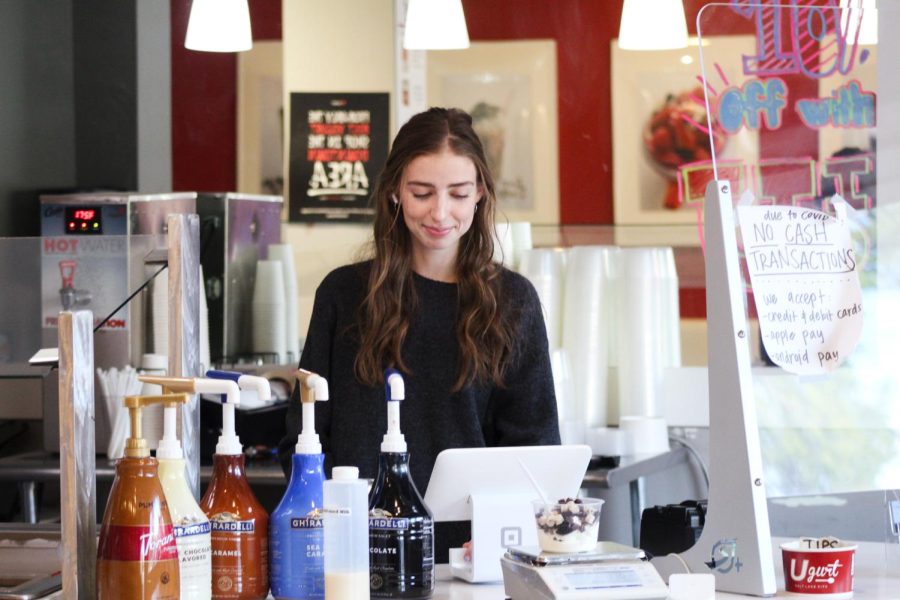Soter: The Labor Shortage is a Good Thing
Brittney Dantuona working at Ugurt located next to the University of Utah on October 04, 2021. (Photo by Langley Hayman | The Daily Utah Chronicle)
October 6, 2021
Because of ridiculously high tuition rates, I work at a café to support myself financially. I can’t complain too much. I get free food, meet some great people and make money all at once. But since COVID-19 vaccinations became available and the shop reopened indoor seating, a new problem has taken center stage.
Suddenly, there has been a noticeable influx of business, which should mean an influx of workers. But, as hard as we tried to hire, we still closed the shop early more often than not because of a lack of workers. Despite management raising wages and posting flyers to encourage applications, the fish won’t bite.
The small staff left has worked overtime leading to burnout and an even smaller staff. But this problem is not unique to this business. Businesses all over the state and the country have seen an increase in business but a lack of workers, even as wages go up.
Forbes magazine reported that “the average hourly wage for private non-farm workers rose $0.20 in April, $0.13 in May and $0.10 in June.” This influx in hourly wages shows that employers raised wages as a way to encourage employment, but even still, the labor shortage persists. You might have heard of this problem referred to as the 2021 labor crisis. But it’s not a crisis — it’s an opportunity for happiness in the U.S.
The Washington Post recently reported that there are 8.4 million unemployed Americans despite 10 million job openings nationwide. The obvious blame for this statistic falls on the COVID-19 pandemic, but which part? Many claim this “crisis” resulted from the pandemic, but this theory is far from the truth.
As the country reopened and unemployment benefits went down, the labor shortage raged on. In Utah, pandemic-specific unemployment programs ended on June 26, 2021. And as of August 2021, Utah saw a 2.6% unemployment rate. Unsurprisingly, 21 other states besides Utah also cut unemployment benefits early. They, too, saw the labor shortage continue. Furthermore, other countries such as Great Britain never raised their unemployment benefits during the pandemic but still experience a labor shortage today.
We should also consider that the pandemic hasn’t ended yet. Case counts continue to surge, hospitals still reach full capacity and the death toll remains high. People may not feel comfortable going back to work yet, or can’t because of COVID-19 restrictions within their workplace. The workforce has completely transformed because of the pandemic. Some of the people who loved going to work can’t go back, and the people who hated in-person work now realize it’s not mandatory.
Since March 2021 the reservation wage, the lowest wage at which a worker will accept a job, for those without a college degree rose by 26%. Nationwide, resignation rates are higher than ever at a jaw-dropping 13% more than rates before the pandemic. Entrepreneurship and early retirement have surged, and finding educators and healthcare workers has become nearly impossible.
Pew Research reported that 66% of unemployed Americans did confess to having the thought of switching fields or careers since the pandemic took hold and their unemployment began.
Essentially, the pandemic has changed all industries in the workforce and because of this many have started choosing different lifestyles. So, the real reason that unemployment rates remain so high is that people want to be happy. The pandemic showed the world just how fleeting life really is. The labor shortage remains because people refuse to go back to jobs that make them miserable. Instead, they’ve chosen to follow their passions to live a life that gives them joy — and the numbers prove it.
People have chosen to start that bakery they’ve always dreamed of, make their hobbies into businesses and actually use their life savings. They no longer want to accept the mediocre work that lacks joy. They’re ready for better. So the current labor crisis is not a crisis at all, but instead, it’s a blessing in disguise.









